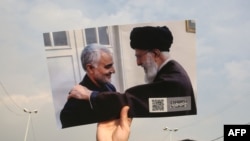ອາຟຣິກາອາດກາຍເປັນສະຖານທີ່ໃນການປະເຊີນໜ້າກັນ ລະຫວ່າງ ສະຫະລັດ ແລະອີຣ່ານ ໃນຂະນະທີ່ເຕຫະຣ່ານຂົ່ມຂູ່ທີ່ຈະຕອບໂຕ້ ຫຼັງຈາກສະຫະລັດໂຈມຕີທາງອາກາດ ທີ່ໄດ້ສັງຫານຜູ້ບັນຊາການກຳລັງອາລກຸດ (Quds Force) ນາຍພົນກາສແຊມ ຊູເລມານີ (Qassem Soleimani)
ອີຣ່ານໄດ້ຊອກຫາຊ່ອງທາງເພື່ອເພີ້ມອິທິພົນຂອງຕົນ ໂດຍສະເພາະໃນບັນດາປະເທດອາຟຣິກາ ໃນຫວ່າງປີມໍ່ໆມານີ້ ຜ່ານກິດຈະການຕ່າງໆ ເຊັ່ນວ່າຂາຍອາວຸດ ເຝິກແອບພວກນັກລົບ ເພື່ອສູ້ລົບ ຢູ່ໃນພາກຕາເວັນອອກກາງ ແລະໃຫ້ທຶນແກ່ຜູ້ຖືສາດສະໜາອິສລາມນິກາຍ (Shia). ນອກນັ້ນຍັງມີຄວາມສຳພັນດ້ານການຄ້າທີ່ສຳຄັນກັບຫຼາຍໆປະເທດ ຮວມທັງອາຟຣິກາໃຕ້.
ທ່ານຟິລິບ ສມິທ (Phillip Smyth) ຜູ້ຊ່ຽວຊານອົງການໂຊແຣຟ (Soref) ຢູ່ທີ່ສະຖາບັນວໍຊິງຕັນ ທີ່ໄດ້ສຶກສາກ່ຽວກັບພວກຫົວຮຸນແຮງ ສາດສະໜາອິສລາມນິ
ກາຍເຊຍ ກ່າວວ່າ ທ່ານບໍ່ຄິດຄາດຝັນວ່າມີຄວາມຈຳເປັນທີ່ອິີຣ່ານຈະໂຈມຕີໂດຍທັນທີ. ທ່ານໄດ້ໃຫ້ຂໍ້ສັງເກດວ່າ ເຂົາເຈົ້າໄດ້ມີປະຫວັດທີ່ລະມັດລະວັງ ແລະເບິ່ງໃນອັນທີ່ທ່ານຮ້ອງວ່າ “ໂອກາດໃນການປະຕິເສດ” ເພື່ອຫລີກລ່ຽງການຕິດຕາມເວລາເຂົາເຈົ້າໂຈມຕີ.
ເວລາເຂົາເຈົ້າໂຈມຕີ ທ່ານກ່າວວ່າ ເປັນໄປໄດ້ທີ່ເຂົາເຈົ້າຈະຊອກຫາຈຸດອ່ອນ ຢູ່ບ່ອນທີ່ບໍ່ຄາດຝັນ.
ທ່ານສມິດກ່າວວ່າ “ຊາວອີຣ໋ານຈະພາກັນຕ້ອງການສະແດງວ່າ ເຂົາເຈົ້າມີອິດທິພົນຢູ່ໃນທົ່ວໂລກ ແລະເຂົາເຈົ້າອາດເບິ່ງຢູ່ບ່ອນໃກ້ໆ ຫຼືເປົ້າໝາຍທີ່ງ່າຍໆທີ່ເຂົາເຈົ້າສາມາດຕອບໂຕ້. ແລະນັ້ນອາດເກີດຂຶ້ນແນ່ນອນຢູ່ໃນອາຟຣິກາ. ແລະມັນອາດເກີດຂຶ້ນຢູ່ອາເມຣິກາເໜືອ ຫຼືຢູໂຣບ ຫຼືໃນແຫ່ງອື່ນໆຫຼາຍບ່ອນ” ນັ້ນຄືຄຳ
ເວົ້າທີ່ທ່ານໄດ້ກ່າວໄວ້.
ທ່ານສມິດ ກ່າວວ່າ ເປັນເວລາຫຼາຍປີມາແລ້ວ ທີ່ກຸມຫົວຮຸນແຮງເຮີສໂບລລາ ທີ່ໄດ້ຮັບການສະໜັບສະໜູນໂດຍອີຣ່ານ ໄດ້ລະດົມ ແລະເຝິກແອບຊາວໄນຈີເຣຍ. ລາຍງານປີ 2018 ສະບັບນຶ່ງ ທີ່ລາຍງານໂດຍສະຖາບັນຕາເວັນອອກກາງ ກ່າວວ່າ ອີຣ່ານໄດ້ສັ່ງໃຫ້ພວກຫົວຮຸນແຮງເຮີສໂບລລາ ເພີ້ມການເຝິກຊ້ອມໃຫ້ແກ່ໄນຈີເຣຍ ແລະຫວັງທີ່ຈະໃຊ້ໄນຈີເຣຍເປັນຖານທັບປະຕິບັດງານ ເພື່ອອອກໄປໂຈມຕີ ແລະ “ຂັບໄລ່ອິສຣາແອລ ແລະຄວາມມັກໃຫຍ່ໄຝ່ສູງ ຂອງປະເທດຕາເວັນຕົກອອກຈາກຂົງເຂດ.”
Africa could emerge as a venue for confrontation between the U.S. and Iran as Tehran threatens to retaliate after the U.S. airstrike that killed the Iranian Quds Force commander, General Qassem Soleimani.
Iran has sought to increase its influence in certain countries in Africa in recent years through activities such as arms sales, training fighters for combat in the Middle East and funding Shia sects. It also has significant trade relations with several countries, including South Africa.
Phillip Smyth, a Soref Fellow at The Washington Institute who studies Shia Islamist militarism, said that he does not necessarily expect the Iranians to strike immediately. He noted that they have historically been cautious and look for what he calls "plausible deniability" to avoid detection when they attack.
When they do strike, he said, it is possible they will look for a soft target in an unexpected location.
"The Iranians are going to want to show that they have influence on a global scale and they may look for low-hanging fruit or easier targets that they can go after," Smyth said. "And that may very well occur in Africa. And it could very well occur in North America or Europe or in many other places," he said.
Smyth said that, for years, Hezbollah, which is supported by Iran, has recruited and trained Nigerians. A 2018 report by the Middle East Institute ((https://www.mei.edu/publications/hezbollah-allegedly-training-nigerian-shiites-expand-influence-west-africa)) stated that Iran had instructed Hezbollah to increase its training of Nigerians and hoped to use Nigeria as a base of operations to launch attacks and "thwart Israeli and Western ambitions in the region."










